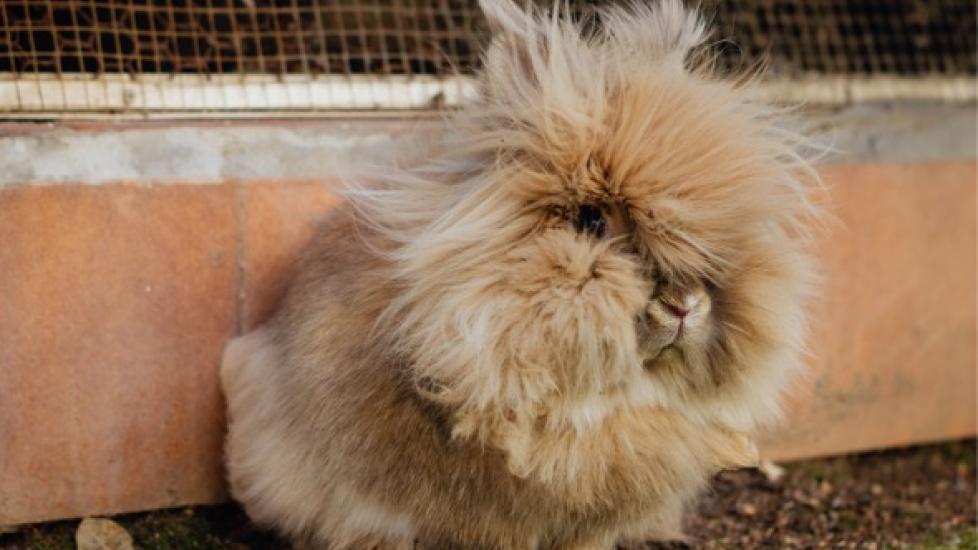Matted Hair and Hairballs in the Stomach in Rabbits
Trichobezoars in Rabbits
A trichobezoar is a technical reference for a mat of hair that has been ingested, and that is often combined with thick or undigested food. It is located in the stomach and/or intestines.
It is not abnormal to find hair in a rabbit's stomach, since they self-groom, and this normally would not cause symptoms or be a cause for concern or a sign of disease. However, inspissated stomach contents (thick, dry, and less fluid and motile), which may include hair, is an abnormal finding and a cause for further inspection. The finding of inspissated contents or a mass of hair may suggest that your rabbit is receiving too little fiber in its diet, or that there is a problem with its gastrointestinal tract.
Unlike cats, which also can suffer from excessive trichobezoars, rabbits are not physically capable of vomiting the contents of their stomachs. For this reason, everything that goes into a rabbit's mouth must be able to pass through the digestive tract, otherwise, the presence of excess hair can lead to severe complications, such as intestinal blockage. If the issue is not resolved quickly, the condition can be fatal.
Symptoms and Types
The signs, symptoms, and type of trichobezoars suffered by the rabbit can depend largely on the causes for the disease and the severity of the problem. Some common signs and symptoms of matted hair in the stomach may include:
- Inappropriate eating habits, including consumption of too many pellets, cereals, and grains during the day
- History of illness or stress
- Weight loss
- Chronic disease
- Scant and small fecal pellets
- Diarrhea
- Abdominal distension
- Slow movement in the stomach, distension or hardening of the stomach
- Firm ingestible material found in the stomach
- Few abdominal sounds coming from the stomach
- Delayed emptying of the stomach
- Abdominal pain on palpation or touching of the stomach
- Decreased activity, and too much time spent in caged quarters
- Teeth grinding, hunched posture and other signs of pain
- Weakness or collapse
- Symptoms of shock
Causes
There are several causes for trichobezoars, or hairballs, in the stomachs of rabbits. These include improper nutrition, and dehydration of the stomach contents. Sometimes metabolic diseases, pain, or stress can contribute to the formation and accumulation of hairballs or matted hair in the stomach. Usually, the finding is that too little gastrointestinal motility is to blame for the collection of hair and other materials in the stomach. One of the culprits may be feeding the rabbit too little hay or coarse fiber, necessary for pushing contents through the digestive tract. Anorexia - an inability to eat -- or simply a prolonged poor appetite can also contribute to the problem.
Diagnosis
There will always be conditions to rule out prior to diagnosing trichobezoars, or related conditions. Diagnostic imaging, such as what can be viewed on X-ray, will allow your veterinarian to investigate the functions of the colon and gastrointestinal tract, and to view the stasis (obstruction), or inability of the digestive tract to pass fecal matter through to the anus. Your doctor will need to determine if there is in fact an obstruction in the gastrointestinal tract, or in the motility, and whether a life-threatening emergency may exist. If an obstruction us found, emergency treatment will be necessary, as this can quickly because a life threatening situation.
In acute (sudden) cases, shock may occur, so it is important to take sensible action quickly. Distension of the stomach is usually clear, and a quick inspection by your veterinarian will find food and hair in the gastric contents. Ultrasound is an excellent diagnostic tool for visualization of the stomach's contents, and to confirm the diagnosis.
Treatment
Severe bloating of the abdomen can be life-threatening, so prompt treatment will be vital to the life of your rabbit. If you find your rabbit with an abnormally distended belly, you will need to take it to the veterinary clinic to be evaluated as soon as possible. Treatment will consist of immediate administration of fluid therapy to re-hydrate the gastric contents in the hope of making the contents more motile. Stomach massage can also sometimes help relieve impacted contents from the stomach cavity.
Decompression may also be helpful. Activity is often recommended for more mobile animals to help promote action within the gastrointestinal system, and a proper diet is essential for restoring proper growth of intestinal flora, and prevention of the overgrowth of bacterial pathogens that could disrupt the healthy growth of bacteria in the gut.
A large selection of natural greens, including collard greens, romaine lettuce, parsley, and spinach are a few of the many greens that are recommended as part of a healthy daily diet for rabbits.
Living and Management
If your rabbit is capable of moving, you should continue to encourage it to do so, avoid pellets and other unhealthy snacks unless otherwise advised by your veterinarian. Rest and relaxation is recommended, with frequent breaks for stretching and motion.
Analgesics (pain relievers) can be helpful for relieving intestinal pain, and antibiotic therapy may be helpful for patients with the diarrhea that is associated with bacterial infections. Be sure to continue the full prescribed treatment until the medication is completely used, and then follow-up with your veterinarian for further advice.
Some drugs, such as NSAIDs, are not indicated for rabbits that are suffering from renal (kidney) failure, and in fact could be placed at further health risk of administered the wrong drugs. You will need to make sure that your veterinarian is aware of your rabbit's health history, especially if your rabbit needs to be treated on an emergency basis and the animal caregiver is not familiar with your rabbit's background health. There are safer drug alternatives that can be just as effective. Rabbits that are treated promptly and effectively for trichobezoars have a good prognosis for a complete recovery.
Featured Image: iStock.com/Carmen Romero
